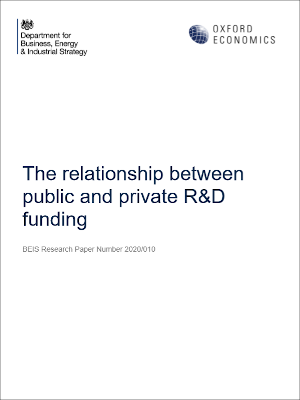Ungated Post | 17 Jul 2020
The relationship between public and private R&D funding

Oxford Economics was commissioned by the Department for Business, Energy and Industrial Strategy (BEIS), to assess the impact of public R&D support on levels of private R&D spending in the UK and other advanced economies.
Innovation enhances productivity and drives long-run prosperity. It can create new and improved products and processes, and generate cost savings for companies and the taxpayer, as well as numerous other benefits. However, a range of market failures mean that if left entirely to the market, the amount of R&D which takes place would be considerably less than optimal. These failures provide a strong case for government intervention to support R&D across the economy.
Against this backdrop, BEIS was looking to deepen its understanding of the impact of public R&D investment on private R&D investment. It commissioned Oxford Economics to undertake independent research to update the evidence base in this field using the most recent and comprehensive datasets, and through the application of the latest analytical techniques.
For the UK, we found that each £1 of public R&D stimulates between £0.41 and £0.74 of private R&D within the same year. In the long run, the same £1 of public R&D eventually stimulates between £1.96 and £2.34 of private R&D (inclusive of the impact in the first year).
Alongside our analysis of the UK, we estimated the link between public and private R&D rates for nine other OECD countries. We found a wide variation in the impacts of public R&D on private R&D across countries. The greatest impact was found for Japan, where £1 of public support would stimulate £3.16 of public investment in the long term. In contrast, the same £1 of public support in Spain would encourage just £1.21 of private investment.
Our economic consulting team are world leaders in quantitative economic analysis, working with clients around the globe and across sectors to build models, forecast markets and evaluate interventions using state-of-the art techniques. Lead consultants on this project were:
Oxford Economics’ team is expert at applying advanced economictools that provide valuable insights into today’s most pressing business, financial,and policy issues.
To find out more about our capabilities, contact:
EMEA
Sam Moore
+44 (0)207 803 1415
Email
Americas
Hamilton Galloway
+1 (646) 503 3068
Email
Asia
Rhianne Clark
+65 6850 0112
Email
Related Services

Post
KPMG M&A Outlook 2026: Between Uncertainty, Resilience, and Seizing Opportunities
Discover how Germany’s M&A landscape is evolving – with a focus on growth, AI and post-merger value creation.
Find Out More
Post
Silver, the next generation metal
This report highlights the critical role silver plays in data centres and artificial intelligence (AI), automotive and electric vehicles (EVs), and solar energy photovoltaics (PVs). With these sectors expected to expand significantly over the coming years, we expect future silver demand to be strong.
Find Out More
Post
Powering the UK Data Boom: The Nuclear Solution to the UK’s Data Centre Energy Crunch
The UK’s data centre sector is expanding rapidly as digitalisation, cloud computing, and artificial intelligence (AI) drive surging demand for high-performance computing infrastructure.
Find Out More